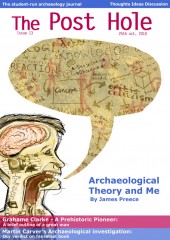The problem with archaeological theory is that it can appear to be irrelevant. It is difficult when discussing terms such as 'processualism' and 'post-processualism' to keep in sight the actual material culture, or the practicalities of life -in any case, a student archaeologist needs to be equipped with far less than an awareness of the impact of relativism in the discipline in order to be able to answer their taxi driver's question about Hungate. Constructivist epistemology goes little towards your 2000 word assessment of an Iron Age settlement, especially in the first two years of an undergraduate degree at York. I am also aware of the marginal status of theory in our own community here at King's Manor. My dissertation, on theory in Roman archaeology, invited curiously few comments from anyone except the faculty, and in fact I myself was worried for a great deal of the time that there was nothing for me to say. In the end, after trawling nearly 1000 papers for discernible trends towards post-processual theories in leading journals, I offered some conclusions and submitted it to the department. My research ended up changing the way I perceive theory, and I want to explore that in this article.
Post-processualism and Roman Archaeology
Post-modern theories in archaeology are really popular: they are called post-processual theories, and have been on the rise in archaeology since the early 1980s. While there is a mass of literature, it can be summed up as a critique of processualist method. Put simply, it is anti-positivist in that it condemns purely scientific explanations and motives to archaeological work, pluralistic in that it encourages input from non-academic and public groups, relativistic in that it dismisses inherent superiorities in cultures or races, and constructivist in that it argues that all work, even scientifically-based work, is ultimately 'constructed', derived or influenced by our deep-rooted prejudices. This collection of thought is perceived to have marked a huge step forward in the purpose and operation of archaeology, as well as its interpretation.
In Roman archaeology, the area I specifically looked at in this study, post-processualism uses the post-colonial experience of the post-war era (undergone by powers like Britain, France and Portugal) to re-evaluate culture interaction in the past. You can see this perspective in the approaches of de Souza, Mattingly, and Bowles (1996, 1997 and 2007 respectively) as well as a number of active explorations of the affect of imperialism on history (e.g. Vance 1997; Struck 2001; Freeman 1997). Even more popular are the semiotic studies which seek to avoid the hole in history left by illiterate groups such as the Britons and Gauls by asking what their material culture signifies, a popular subject for discussion in the volumes of the Theoretical Roman Archaeology Conference (TRAC) proceedings.
So it was incredibly hard for me to argue that all of this is rubbish. More than that, I set out to claim that post-processualism is actually damaging interpretation, at least in the field of Roman archaeology. To do this, I had to argue two very ambitious claims:
- That post-processualism does not exist
- That post-processualists have warped research agendas
These arguments were not necessarily contradictory - I maintain that even if post-modernism does not exist, the influence of those who believe in it does. With this double aim in mind I set out to restore processualism, in whatever way I could with the resources at my disposal.
Post-modernism as Smoke and Mirrors
The first task - to establish that the theory does not exist- was straightforward enough, and there have been several critiques already in circulation from which I could base my own assessment. Foremost among them, in my opinion, has been Alex Callinicos' (Callinicos 1989) Marxist interpretation, which not only attempts a deconstruction of the theory but also insists that there is no real difference between the 'modern' world and the 'post-modern' one - quite a sharp crack in the theoretical foundations. I used this as a starting point from which to attack the originality of post-processualism, arguing that relativism, deconstruction, political intrinsicality, et cetera, were already hallmarks of processualism and even before (see Carr 1961; Betts 1971; Huxley & Haddon 1935 respectively for examples), long before scholars started citing certain French philosophers —whom shall remain nameless- in their works. In this I believe I am doing something new. Critics (e.g. Kohl 1996) and even opponents (e.g. Faulkner 2007) of post-processualism all seem to agree that the theory at some level exists, but to accept this and then to argue on the general lines of argument seems too pedantic and conditional.
This leads to the question, then, of 'why does this matter?' Processual or post-processual, surely the field is advancing in great strides as far as interpretation is concerned. Well, maybe not. The problem as far as I can see is that by pigeonholing post-processualism as something separate and distinct from what supposedly went before, post-modernists have been hoisted by their own petard. The post-processualists created an identity for themselves by defining themselves as against something as vague and ill-defined as processualism; they characterise processualist work as mechanical, uninspired and inhumane, and their own as somehow more vigourous, imaginative and applicable to present day political concerns. I can tell you with the authority of one who has read every single paper in a decades' worth of the Theoretical Roman Archaeology Conference that the pages ooze with uninspired research based on vague spatial analyses handed to them by ArcGIS, introduced to the reader with a token prescribed argument for semiotic study, or against metanarratives, or for constructivism, or against objectivity, ad nauseum.
Conclusion
In the end, the weakest part of my argument was that in all of this archaeologists have lost sight of the core questions in Roman archaeology, urbanism and the economy. This was hampered in part by a lack of resources in the library vital to my illustration of the neglect this area is enduring, and also because the latest editions of the Oxford Journal of Archaeology have been almost utterly inspired by the recent economic downturn*, prompting something of a revival. Yet the way these subjects are tackled cannot be tackled with semiotics, or buzzwords dreamt up by the leading philosophers of the day, but with processual rigour in the practice and technology of data-collection, and processual interest in debate and differing interpretations. I believe I have demonstrated here that the most useful tools of our interpretative trade had already been developed by the Hodder-dominated 1980s, and have persuasively suggested some negative aspects to post-processualism through its hostile, holier-than-thou attitude. One might very well argue that perhaps a useful side effect of the world going down the drain is that scholars might think a little more about what really makes the world turn. But I digress.
*Ironically, the cumulative-frequency charts I assembled for the economy-related articles in the OJA are perhaps the only charts in existence related to the current economic climate that displays a positive correlation.
Bibliography
- Betts, R. F. (1971) 'The Allusions to Rome in British Imperial Thought of the Late Nineteenth and Early Twentieth Centuries' Victorian Studies 15: 149-159.
- Bowles, C. R. (2007) Rebuilding the Britons: the postcolonial archaeology of culture and identity in the late antique Bristol Channel region. Oxford: John and Erica Hedges Ltd.
- Callinicos, A (1989) Against Postmodernism: a Marxist critique. Cambridge: Polity Press.
- Carr, E. H. (1961) What Is History? London: Penguin Books.
- De Souza, P. (1996) 'They Are The Enemies of Mankind': justifying Roman imperialism in the Late Republic' in J. Webster and N. Cooper (eds) Roman Imperialism: post-colonial perspectives, 125-133. Leicester: School of Archaeological Studies.
- Faulkner, N. (2007) 'Roman Archaeology in an Epoch of Neoliberalism and Imperialist War' TRAC 2007: 63-73
- Freeman, P. (1997) 'Mommsen to Haverfield: the origins of studies of Romanization in the late 19th-c. Britain' in DJ Mattingly (ed) Dialogues in Roman Imperialism: power, discourse, and discrepant experiences in the Roman Empire, 27-50. Portsmouth, R.I.: Journal of Roman Archaeology.
- Huxley, J. and Haddon, A.C. (1935) 'The Racial Question —theory and fact' Antiquity 9: 261-276
- Kohl, P. L. (1993) 'Limits to a Post-processual Archaeology (or, the dangers of a new scholasticism)' in N. Yoffee and A. Sherrat (eds) Archaeological Theory: who sets the agenda? Cambridge: Cambridge University Press.
- Mattingly, D. J. (1997) 'Africa: a landscape of opportunity?' in DJ Mattingly (ed) Dialogues in Roman Imperialism: power, discourse, and discrepant experiences in the Roman Empire, 117-139. Portsmouth, R.I.: Journal of Roman Archaeology.
- Struck, M. (2001) 'The Heilige Romische Reich Deutscher Nation and Hermann the German' in R Hingley (ed) Images of Rome: perceptions of ancient Rome in Europe and the United States in the modern age, 91-112. Portsmouth, R.I.: Journal of Roman Archaeology.
- Vance, N. (1997) The Victorians and Ancient Rome. Oxford: Blackwell




